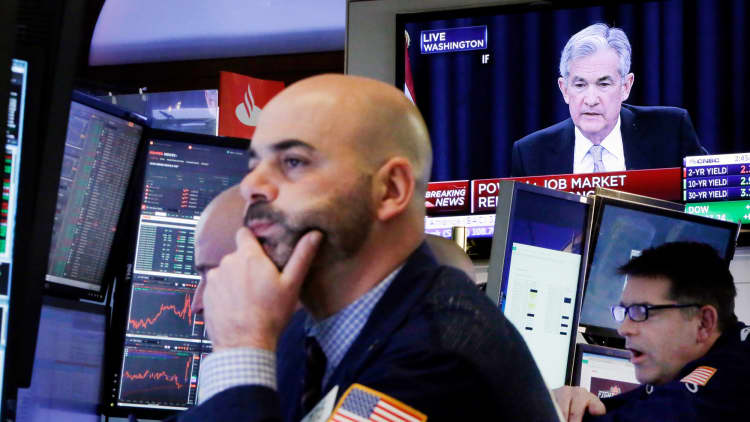Stocks in Asia were broadly lower on the final trading day of the week after the U.S. Federal Reserve left interest rates unchanged at its latest policy meeting.
The big mover to the downside was in Hong Kong, where the Hang Seng index fell 2.39 percent to close at 25,601.92.
The mainland China markets, which investors are watching closely as trade tensions between Washington and Beijing continue to weigh on sentiment, ended the trading week lower. The Shanghai composite shed 1.39 percent to close at around 2,598.87 and the Shenzhen composite declined by 0.434 percent to about 1,328.19.
The moves in China followed the country's Consumer Price Index and Producer Price Index for the month of October coming in at 2.5 percent and 3.3 percent higher, respectively, compared to a year ago. Those numbers were in line with expectations from a Reuters poll.
One economist warned that relations between the U.S. and China could get more frosty now that the midterm elections stateside are over.
"The upshot is that there will be more noise and volatility on China," TS Lombard's chief U.S. economist, Steve Blitz, said in a note on Thursday, commenting on the post-election environment. Many Democrats, including Sen. Chuck Schumer, are "China hawks," Blitz said.
Another market observer said the expected meeting between U.S. President Donald Trump and his Chinese counterpart Xi Jinping during the upcoming G-20 summit is unlikely to yield results.
"I wouldn't bank on seeing anything solid on the back of that actually play through," Kerry Craig, a global market strategist at J.P. Morgan Asset Management, told CNBC's "Squawk Box" on Friday. Still, he predicted the meeting between the two leaders would be "very cordial."
In other Asian market news, Japan's Nikkei 225 fell 1.05 percent to close at 22,250.25 while the Topix index saw losses of 0.49 percent to end the trading week at 1,627.98.
South Korea's Kospi slipped 0.31 percent to close at 2,086.09, with the moves coming after the country's president, Moon Jae-in, fired his top economic policymakers and replaced them with people from within the government. According to Reuters, the move indicates Moon aims to reinforce his controversial economic policies, which economists have said were hurting growth.
In Australia, the slipped by 0.11 percent to close at 5,921.8, with the major sectors mixed. Energy stocks fell by 1.25 percent while the heavily weighted financial subindex recovered to see gains of 0.23 percent.
Fed leaves rates unchanged
Overnight on Wall Street, the slipped 0.25 percent to close at 2,806.83 and the Nasdaq Composite saw declines of 0.5 percent to 7,530.88 by the closing bell. The Dow Jones Industrial Average, on the other hand, climbed 10.92 points to close at 26,192.22 — marking a four-session winning streak.
The moves came after the Fed kept interest rates unchanged, as was widely expected. The central bank said in a statement, however, that it expects "further gradual increases" in the overnight rate. The Fed also did not mention the volatility that has hit the market recently.
"This Fed meeting may be the catalyst (that) slows up the feel good factor that the markets have enjoyed over the last few sessions post the US midterm election results," Rakuten Securities Australia said in a morning note.
"We'd seen a positive 'risk on' trading environment after the midterms (passed) largely in line with expectations, but with the Fed confirming that they are sticking with their well defined path we may see some of the investor concern returning to markets and some further downside for the stock indices over the next few sessions," the note said.
The Fed has hiked rates three times this year and is forecast to raise one more time before year-end.
U.S. crude futures slip further into bear market territory
U.S. crude futures slipped 0.56 percent in the afternoon of Asian trade at $60.33 per barrel after settling in bear market territory in the previous session.
The global benchmark Brent crude futures contract also fell into negative territory after earlier seeing gains, declining by 0.2 percent at $70.51 per barrel.
Crude prices have plunged over the last five weeks. They've been buffeted by October's broader market slump, signs of deteriorating demand and rising output from key producers.
Currencies
The U.S. dollar index, which tracks the greenback against a basket of its peers, was at 96.882 after seeing lows around the 96 handle yesterday.
The Japanese yen was at 113.80 against the dollar after weakening from levels above 113.6 in the previous session. The Australian dollar traded at $0.7244 after seeing highs above $0.729 yesterday.
— CNBC's Fred Imbert and Tom DiChristopher, along with Reuters, contributed to this report.
WATCH: Five market experts break down how to invest as interest rates spike



